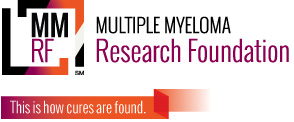 Initiative will deploy predictive big data analytics to analyze patient data from landmark CoMMpass Study™ to speed drug discovery and development for patients with multiple myeloma
Initiative will deploy predictive big data analytics to analyze patient data from landmark CoMMpass Study™ to speed drug discovery and development for patients with multiple myeloma
CAMBRIDGE, Mass. and NORWALK, Conn. – Jan. 7, 2015 – GNS Healthcare (GNS), a leading provider of analytics solutions for driving personalized interventions that improve population health, and the Multiple Myeloma Research Foundation (MMRF), a leader in accelerating the development of breakthrough multiple myeloma therapies, today announced a collaboration to speed the discovery of innovative treatments for patients with multiple myeloma. The effort will combine the unprecedented genomic and clinical data from the MMRF’s landmark CoMMpass Study™ with revolutionary GNS machine learning platforms and rapid computer simulations. The work supports the development of computer models of myeloma disease that may uncover novel molecular pathways that can prevent progression of disease and address the unmet treatment needs of patients with multiple myeloma.
CoMMpass is a longitudinal study of 1,000 newly diagnosed patients with active multiple myeloma. Its objective is to map each of these patients’ genomic profiles to clinical outcomes to develop a more complete understanding of patient responses to treatments.
“Through creative, dynamic partnerships, we continually build new research models to accelerate development of the most promising treatments for patients with multiple myeloma,” says Walter M. Capone, President and Chief Executive Officer of the MMRF. “This collaboration with GNS to apply leading-edge computer models and analytics to uncover disease pathways in the diverse CoMMpass data set exemplifies this strategy. We are excited by the real potential of this project to make rapid and meaningful progress toward a cure for multiple myeloma.”
GNS will use an in silico process, applying its MAX™ architecture and patented REFS™ inference engine and simulation platforms to the CoMMpass data. REFS will identify causal drivers and underlying molecular processes of disease progression. REFS will also discover the most likely targets for therapeutics to treat, and perhaps to predict and prevent, relapses and refractory disease. REFS will also discover predictive diagnostic biomarkers that determine which treatments will work and for which patients. The work promises to support physicians and patients with a broader set of individualized treatment protocols mapped to specific molecular and genomic characteristics.
“This work embodies the transformative role for big data analytics to uncover specific treatment protocols that have a much better chance of success for individual patients,” says Colin Hill, CEO and co-founder of GNS. “REFS turns large datasets into computer models that reveal new molecular pathways and targets that, up until now, could not be easily identified. It ultimately accelerates many of the traditional steps in the drug discovery and development process, bypassing obstacles that often delay or prevent promising, new treatments from reaching patients.”
GNS has used REFS successfully to advance the research priorities of numerous nonprofit organizations focused on diseases including Huntington’s disease, multiple sclerosis, childhood asthma, Alzheimer’s disease and others. Its work ultimately enables next-generation care management solutions focused on reducing adverse events, slowing disease progression and improving therapeutic effectiveness through precision medicine.
About the CoMMpass Study™
CoMMpass is a longitudinal study of patients with newly-diagnosed active multiple myeloma. The goal is to map the genomic profile of each patient to clinical outcomes to develop a more complete understanding of patient responses to treatments. A cornerstone of the MMRF’s Personalized Medicine Initiative, the study will collect and analyze tissue samples and genetic information from approximately 1,000 newly diagnosed multiple myeloma patients for at least eight years.
The study is designed to show what treatments are used most often as first and subsequent lines of therapy, and to correlate this information with critical therapeutic response criteria including best responses achieved, overall survival, time to disease progression and quality of life measures. It is also powered to track treatment data to correspond with genetic information such as mutations and translocations (the movement of a chromosomal segment from one position to another, a phenomenon that often occurs in cancer).
About Multiple Myeloma
Multiple myeloma is a cancer of the plasma cell. It is the second most common blood cancer. An estimated 24,050 adults (13,500 men and 10,550 women) in the United States will be diagnosed with multiple myeloma in 2014 and an estimated 11,090 people are predicted to die from the disease. The five-year survival rate for multiple myeloma is approximately 43%, versus 28% in 1998.
About the Multiple Myeloma Research Foundation (MMRF)
The Multiple Myeloma Research Foundation (MMRF) was established in 1998 as a 501(c)(3) non-profit organization by twin sisters Karen Andrews and Kathy Giusti, soon after Kathy’s diagnosis with multiple myeloma. The mission of the MMRF is to relentlessly pursue innovative means that accelerate the development of next-generation multiple myeloma treatments to extend the lives of patients and lead to a cure. As the world’s number-one private funder of multiple myeloma research, the MMRF has raised $270 million since its inception and directs nearly 90% of total budget to research and related programming. As a result, the MMRF has been awarded Charity Navigator’s coveted four-star rating for 11 consecutive years, the highest designation for outstanding fiscal responsibility and exceptional efficiency. For more information about the MMRF, please visit:www.themmrf.org.
About GNS Healthcare
GNS Healthcare provides analytic solutions that predict the impact of individual interventions to improve population health and reduce costs. Based on the MAX™ Care Management Architecture and patented REFS™ inference engine, GNS helps health plans and providers plan, implement and measure interventions that benefit individuals and drive population-level ROI. These cloud-based solutions are being deployed to improve outcomes associated with medication non-adherence, metabolic syndrome, diabetes, pre-term birth, and specialty care medications. GNS solutions focus on reducing adverse events, slowing disease progression, and improving therapeutic effectiveness through precision selection that reduces wasteful spending and maximizes impact.
GNS Healthcare, Driving Intelligent Interventions
Media Contact:
Gina Veazey
703-254-6276
gveazey@gnshealthcare.com